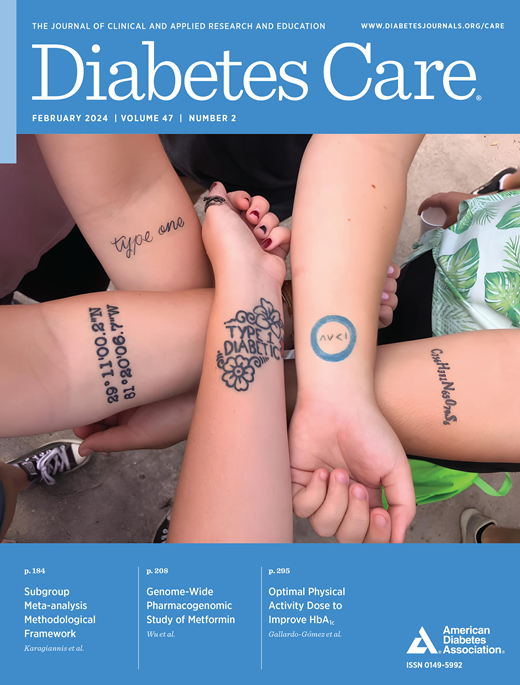Nutritional Status, Dietary Intake, and Nutrition-Related Interventions Among Older Adults With Type 1 Diabetes: A Systematic Review and Call for More Evidence Toward Clinical Guidelines
IF 14.8
1区 医学
Q1 ENDOCRINOLOGY & METABOLISM
引用次数: 0
Abstract
There is an emerging population of older adults (≥65 years) living with type 1 diabetes. Optimizing health through nutrition during this life stage is challenged by multiple and ongoing changes in diabetes management, comorbidities, and lifestyle factors. There is a need to understand nutritional status, dietary intake, and nutrition-related interventions that may maximize well-being throughout the life span in type 1 diabetes, in addition to nutrition recommendations from clinical guidelines and consensus reports. Three reviewers used Cochrane guidelines to screen original research (January 1993–2023) and guidelines (2012–2023) in two databases (MEDLINE and CENTRAL) to characterize nutrition evidence in this population. We found limited original research explicitly focused on nutrition and diet in adults ≥65 years of age with type 1 diabetes (six experimental studies, five observational studies) and meta-analyses/reviews (one scoping review), since in the majority of analyses individuals ≥65 years of age were combined with those age ≥18 years, with diverse diabetes durations, and also individuals with type 1 and type 2 diabetes were combined. Further, existing clinical guidelines (n = 10) lacked specificity and evidence to guide clinical practice and self-management behaviors in this population. From a scientific perspective, little is known about nutrition and diet among older adults with type 1 diabetes, including baseline nutrition status, dietary intake and eating behaviors, and the impact of nutrition interventions on key clinical and patient-oriented outcomes. This likely reflects the population’s recent emergence and unique considerations. Addressing these gaps is foundational to developing evidence-based nutrition practices and guidelines for older adults living with type 1 diabetes.1 型糖尿病老年患者的营养状况、膳食摄入量以及与营养相关的干预措施:系统综述和呼吁为临床指南提供更多证据
现在有越来越多的老年人(≥65 岁)患有 1 型糖尿病。在这一生命阶段,通过营养优化健康面临着糖尿病管理、并发症和生活方式等多重持续变化的挑战。除了临床指南和共识报告中的营养建议外,还需要了解 1 型糖尿病患者的营养状况、膳食摄入量以及与营养相关的干预措施,这些措施可能会最大限度地提高 1 型糖尿病患者一生中的健康水平。三位审稿人使用 Cochrane 指南筛选了两个数据库(MEDLINE 和 CENTRAL)中的原始研究(1993 年 1 月至 2023 年)和指南(2012 年至 2023 年),以确定该人群的营养证据特征。我们发现明确关注年龄≥65 岁的 1 型糖尿病成人营养和饮食的原创研究(6 项实验研究、5 项观察研究)和荟萃分析/综述(1 项范围界定综述)非常有限,因为在大多数分析中,年龄≥65 岁的患者与年龄≥18 岁的患者合并在一起,糖尿病持续时间各不相同,而且 1 型和 2 型糖尿病患者也合并在一起。此外,现有的临床指南(n = 10)缺乏特异性和证据来指导该人群的临床实践和自我管理行为。从科学角度来看,人们对 1 型糖尿病老年患者的营养和饮食知之甚少,包括基线营养状况、饮食摄入和饮食行为,以及营养干预对主要临床和以患者为导向的结果的影响。这可能反映了这一人群的新近出现和独特的考虑因素。弥补这些不足是为 1 型糖尿病老年人制定循证营养实践和指南的基础。
本文章由计算机程序翻译,如有差异,请以英文原文为准。
求助全文
约1分钟内获得全文
求助全文
来源期刊

Diabetes Care
医学-内分泌学与代谢
CiteScore
27.80
自引率
4.90%
发文量
449
审稿时长
1 months
期刊介绍:
The journal's overarching mission can be captured by the simple word "Care," reflecting its commitment to enhancing patient well-being. Diabetes Care aims to support better patient care by addressing the comprehensive needs of healthcare professionals dedicated to managing diabetes.
Diabetes Care serves as a valuable resource for healthcare practitioners, aiming to advance knowledge, foster research, and improve diabetes management. The journal publishes original research across various categories, including Clinical Care, Education, Nutrition, Psychosocial Research, Epidemiology, Health Services Research, Emerging Treatments and Technologies, Pathophysiology, Complications, and Cardiovascular and Metabolic Risk. Additionally, Diabetes Care features ADA statements, consensus reports, review articles, letters to the editor, and health/medical news, appealing to a diverse audience of physicians, researchers, psychologists, educators, and other healthcare professionals.
 求助内容:
求助内容: 应助结果提醒方式:
应助结果提醒方式:


